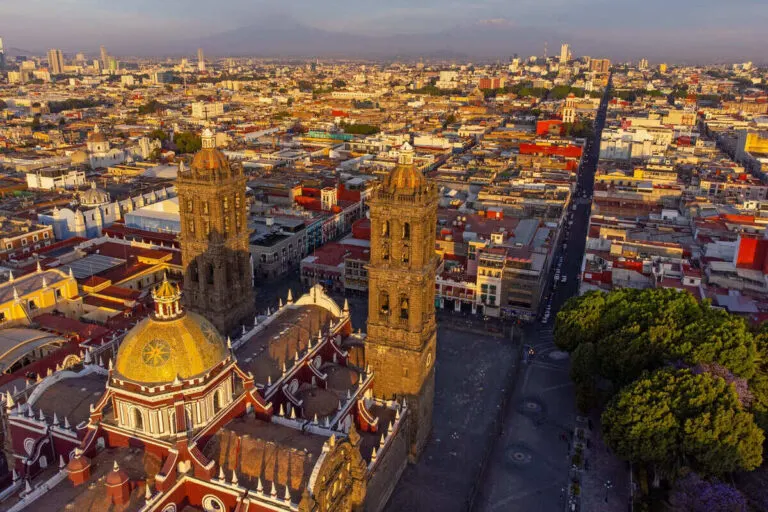Famous for its balmy weather, impressive diversity and delectable cuisine, Mexico continues to lead booking trends for Americans traveling abroad this summer, whether it’s the architectural grandeur of Mexico City or the turquoise waters of Cancun that’s their aim.
Though it’s been largely overlooked up until now, there’s also been a renewed interest in the city of Puebla, especially among culture buffs who are keen on sampling a different flavor of Mexico—you know, without the usual crowds and dollarized restaurant prices.
A colonial gem dating back over 500 years, Puebla is finally getting the praise it deserves, rising as one of the country’s most prolific cultural destinations:
What Makes Puebla So Special?

Puebla doesn’t have a coast, nor an ultra-luxurious hotel strip, nor is it particularly known for being a wellness haven, but it has that one special something a majority of Mexico’s Americanized summer resorts lack: that irresistible Old World allure.
Located a short two-hour drive southeast of Mexico City, Puebla was founded in the early 16th century by Spanish settlers, who introduced their concept of city-building and European infrastructure in an area that, prior to 1531, was sprinkled with indigenous settlements.

History isn’t kind to all, and though the Indigenous were either pushed out or forced to assimilate, Puebla grew to become an important center for knowledge and the arts during the period of Spanish rule: it is a planned, viceregal city, with all the stateliness that that implies:
Its Zócalo (or Central Square) is dominated by the Renaissance-inspired Puebla Cathedral, characterized by its twin set of belfries and ornate facade, and richly-decorated, art-filled interior that is in no way inferior to Europe’s grand cathedrals.

Puebla’s colonial center as a whole is one of the best-preserved in Mexico, with low houses painted in vibrant colors, cobblestone streets that could easily belong in the continent opposite, and a plethora of museums and cultural sites.
What Is There To See And Do In Puebla?
For starters, Puebla lays claim to the magnificent Biblioteca Palafoxiana, founded as early as 1646, the first public library in the Americas, Chapel of the Rosario, the centerpiece of Mexican Baroque, and described by locals as Eight Wonder of the World, and the Spanish-built Fort Loreto.
There’s a never-ending list of heritage buildings and historic monuments around Puebla, and it’s no wonder it is a UNESCO-protected zone, where modernist developments are severely restricted: the goal is to protect, and preserve the ancient character.
Outside the city center, the main attraction is Cholula, a municipality that forms a conurbation with Puebla, famous for its Great Pyramid, a pre-Hispanic structure topped with a striking, yellow-washed colonial sanctuary, and high concentration of churches.

That’s not to say all of Puebla is picturesque plazas and colorful backstreets: it is the capital of the state of Puebla (yep, both carry the same name), and like in any other economic hub, don’t be shocked to find the usual skyscraper-dotted urban sprawl beyond the quaintness of the Old Town.
Much like Mexico City, however, it’s the contrast between old and new that makes it so awe-inspiring: that, and the culinary delights.
One Of The Most Celebrated Regional Cuisines Of Mexico

Puebla is as renowned for its cuisine as it is for its cultural value, and if you’re ever in town, you should make sure you try their mole poblano sauce, made from savory chile and cocoa, chiles en nogada, bathed in a creamy walnut sauce, and the signature spicy Arab tacos.
Puebla has historically been a secondary destination in Mexico, somewhere you’d visit if you’ve already ticked off all the ‘main’ cities, and you’re looking for the new and unexpected; this year, however, it’s started to rise steadily up the tourism charts:
A 12.7 percent increase in tourism has been confirmed in the first yearly quarter alone compared to last year, and other than Puebla’s undeniable beauty and historical significance, the newfound success has been attributed to a range of new accolades that have helped promote the city on an international stage.
These include placing first in the gastronomy category of the México Desconocido‘s Best of Mexico Awards, and featuring on TripAdvisor’s list of Best of the Best Destinations (plus, Puebla is yet to be overrun with tourists as other colonial cities in its ranks).

Puebla Is Cheaper To Visit Than Most Tourist Hotspots In Mexico
On top of its fascinating culture and delectable cuisine, Puebla is relatively cheaper to visit than other world-renowned colonial cities of Mexico.
An overnight stay at the landmark Casa Juarez, a historic boutique hotel housed in a former colonial pension, costs only $104 to book per night, while an overnight stay at the Luma B&B Boutique Hotel, a short 20-minute walk to Puebla Cathedral, is an equally-affordable $97.
If you’re wondering how much food costs, tacos and other typical street snacks can be as cheap as $5 cash, while meals at inexpensive restaurants average $8, and more elaborate, three-course dinners for two cost $38, based on Numbeo estimates.
Credit: Source link



